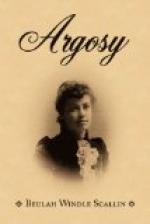I came down very late to breakfast this morning—my first breakfast in the country is always luxuriously late—and I found a tall and pretty young girl busy building up the fire in my sitting-room. I guessed at once she was the “Annie” of whom I heard a long and pleasing account last night. Annie is the image of what her mother must have been twenty years ago. She has the same agreeable blue eyes, the same soft straw coloured hair. But while Mrs. Anderson wears hers in bands at each side of the head, Annie’s is drawn straight back to display the smoothest of white foreheads, the freshest of freckled little faces in the world. She is about seventeen, and a sweet girl, I feel sure. Could no more play with a man’s feelings than she could torture one of the creatures committed to her care. She has charge of the poultry, she tells me, and is allowed half the profits. Mem.—I shall eat a great many eggs.
April 5.—I have done an excellent thing in exchanging the hollow shams of society for the healing powers of nature. I shall live to forget Catherine and to be happy yet. And there was after all something artificial about that girl. Pretty, certainly, but with the beauty of the stage; now little Annie here is pretty with the beauty of the sky and meadows.
I am delighted with this place. There is nothing like the country in early spring. Suppose I were never to go back to town again, but stay with the Andersons, see them through the lambing season, lend a hand at tossing the hay, swing a scythe at corn cutting (and probably cut off my own legs into the bargain), drink a health at son Robert’s wedding, and then during the winter—yes, during the long dark winter evenings when the wind raves round the old house and whistles down the chimneys, when the boom of the sea echoes all along the coast as it breaks against the cliffs—then to sit in the cosy sitting-room, with the curtains drawn along the low windows, a famous fire flashing and glaring upon the hearth, one’s limbs pleasantly weary with the day’s labour, one’s cheeks tingling from exposure to the keen air; would not this be an agreeable exchange for the feverish anxieties and stagnant pleasures of London life?
After a time, a considerable time no doubt, it would possibly occur to Catherine to wonder what had become of me.
April 6.—Easter Sunday. I am writing in my sitting-room window. I raise my eyes and see first the broad window-sill, whereon stand pots of musk and geranium, not yet in flower; then through the clear latticed panes, the bee-haunted garden, descending by tiny grassy terraces to the kitchen-garden with its rows of peas and beans, its beds of lettuce and potatoe, its neat patches of parsley and thyme; then a field beyond. I note the double meandering hedge-line that indicates the high road, and beyond again the ground rises in sun-bathed pastures and ploughed land to the gorse-covered cliff edge with its background of pure sky; a little to the right, yet still in full view from my window, is an abrupt dip in the cliff, which shows a great wedge of glittering sea. It is here that my eyes always ultimately rest, until they ache with the dazzle and the beauty, and then by a natural transition I think of—Catherine.




